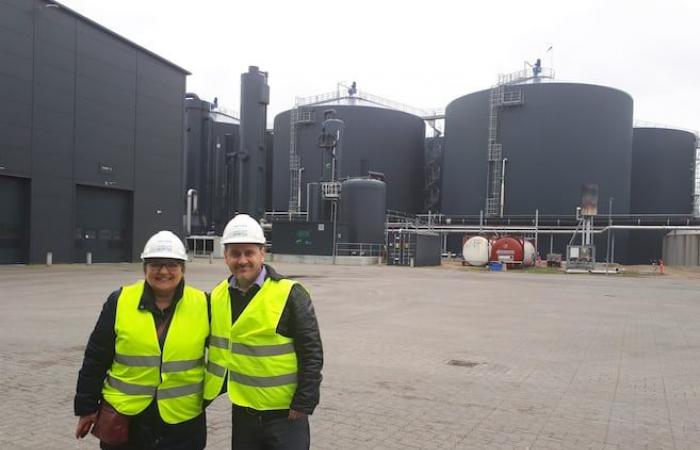“It’s big news,” says Patrick Melchior, the mayor of Farnham, who blames the blow. He has been following this project for four years.
He even went to Denmark in 2020 to visit Nature Energy’s biomethanization facilities.
For almost two years, Nature Energy and Énergir Développement (formerly Gaz Métro) have been co-developing the Farnham biomethanization project in order to valorize agricultural biomass to produce renewable natural gas.
Nature Energy, a subsidiary of the oil company Shell, one of the largest multinationals on the planet, puts forward arguments of unfavorable economic conditions to explain its exit from the project.
“Despite considerable progress and valuable lessons learned, the difficult decision was made not to proceed with the project,” explained a Shell spokesperson by email Tuesday evening. Several factors influenced the decision, including an evolving provincial regulatory and policy environment, complexities in the raw material supply chain, as well as current economic conditions of the project which do not meet Shell’s requirements to proceed with a investment.”
“This does not mean stopping the development of the project.”
— Jean-François Jaimes, executive director at Énergir development
At Énergir, however, we want to be reassuring, particularly to the hundred or so farmers who are collaborating on the project.
“With its entrepreneurial vision and greater risk tolerance, Énergir Développement will evaluate in the coming weeks a plan to take over the Farnham project, which remains a promising initiative for the local economy, the environment and agricultural producers,” wrote Energize partner agricultural producers, Monday.
60/40
Nature Energy was in principle to invest the equivalent of 60% of the 200 million. Énergir, for its part, took responsibility for the remaining 40%.
Énergir is considering the possibility of becoming the sole promoter of the project for this plant in Farnham.
“We definitely want to continue this project. But we have to do our homework to ensure that we will take it back.”
— Jean-François Jaimes
Renewable natural gas, produced in part at the Farnham plant, is indeed at the heart of Énergir’s business strategy.
Énergir, which only learned last week of the withdrawal of its business partner, is in the process of digesting what this new situation means for it.
She estimates that she will be able to confirm at the beginning of 2025 “with certainty” whether or not she is taking over the entire project.
“The chances are pretty good,” believes Mr. James. We want to be reassuring.”
A “good project”
For Énergir Développement, the biomethanization plant project remains a “good project”.
“We want to find ways to restart the development of the project,” indicates Jean-François Jaimes, executive director at Énergir development.
“We still believe in the economic and environmental potential of this project in Farnham,” he adds.
Remember that in terms of greenhouse gases (GHG), we expected to save 60,000 tonnes per year with this plant, or the equivalent of 12,000 vehicles removed from the roads, said Joseph Marra, vice-president of project development at Nature Energy, during a meeting in fall 2023.
This is the GHG estimate of the methane currently released by the 715,000 tonnes of biomass (slurry and manure) which will go to the factory.
A “big missed appointment”?
If the project were to be stopped for good, “it would be a big missed opportunity for the environment,” says Mayor Melchior.
The mayor hopes that the Quebec government will participate financially in the project.
Quebec was part of the initial financial package, via the Renewable Natural Gas Production Support Program, for which the project was eligible.
Jean-François Jaimes, from Énergir, during the second open house presented in Farnham, in fall 2023 (Stéphane Champagne/Archives La Voix de l’Est)
This program, which was equivalent to several millions, according to Mr. Jaimes, is, according to him, awaiting renewal.
“We don’t expect the government to come in as a savior,” he adds.
Despite the withdrawal of Nature Energy, the size of the project would remain the same.
Indeed, the design of the project is very advanced, according to Mr. Jaimes, in terms of engineering, financing and biomass supply.
Preparatory work on the ground has already been done.
Permits from the Quebec Ministry of the Environment were also obtained last May.
The gas produced could heat nearly 15,000 homes.
Citizen concerns
Remember that the biomethanization plant project sparked reactions from residents of Farnham, particularly those who live near the site.
One of these residents, Nathalie Tanguay, insisted in particular on the minimum distance of 500 m which must separate the factory from the first homes, according to recommendations from the Ministry of the Environment of Quebec found in the document entitled “Guidelines for the supervision of biomethanization activities”.
The problem, according to her, is that several residences and businesses are located just 250 m from the site of the future factory, “a residence and a few businesses [étant même situés] less than 100 m,” she denounced last fall.






